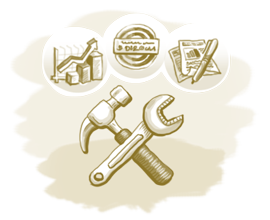 It used to be that a sales rep making halfway decent numbers had a future.
It used to be that a sales rep making halfway decent numbers had a future.
But in today’s highly competitive marketplaces and internet-assisted buying, it takes more than just numbers for a salesperson to truly survive. A topflight sales force must be composed of experts in every area of their craft.
Here is the recommended sales force skill ladder:
Steady Earners
There are times when sales management will turn to a particular rep when they are out of time, right up against the quota and a great sale is needed. That rep will pull it off and the quota will be made.
But today what is being more highly valued is not so much the rep that can pull it off in dire straits, but the salesperson who is steadily making the quota. Sales management’s dream is a sales force composed of such individuals.
Meeting Sales Forecasts
A good part of the reason for such a dream is the fact that when sales forecasts are composed, forwarded to top company executives and all other concerned stakeholders, it is expected that those forecasts will be met. The primary way that’s going to happen is if the sales force is composed of salespeople that routinely make those forecasts come true.
What happens when those forecasts are met or exceeded in the majority of cases? Confidence in the company both from within and without increases exponentially. Against those forecasts, the organization can invest in infrastructure, hires, and bonuses without feeling so much like gamblers at a craps table.
An important note must be made, however, that in order for forecasts to be truly accurate a robust CRM solution must be in place that utilizes precise sales analytics. With these tools, sales management isn’t totally dependent on sales rep “best guess” for closing deals and will be able to utilize hard data (leads and deals already in the pipeline, closing ratios, average length to close and other such measures) to create a realistic forecast.
Sales Force Skill Ladder
The skillset of salespeople today must encompass the ability and capacity to function at different customer relationship levels. These levels start at the bottom with simple selling to one person, one time or even selling to incoming callers, and run all the way up the line to someone the customer considers more of a partner than a salesperson. A larger percentage of salespeople—especially new ones—function at the lower rungs; as one proceeds on up that ladder a skillful rep becomes rarer and rarer.
Because of the ability of a buyer to totally scope out a product or service and its company online, and even in some cases make a purchase, those lower levels are actually disappearing in many industries. Live salespeople may not even become involved until a particular level of trust or expertise is required. Hence it is in a salesperson’s very best interest to gain the skills necessary to meet those upper qualifications—or he or she may actually be out of a job.
Sales Analytics Make the Selection
How does sales management know who is making that kind of grade and who isn’t? Relying on salesperson anecdotes and (worse) colleague gossip is a very questionable way to go. As with creating accurate forecasts, it takes the right CRM solution and precise sales analytics to fully view salespeople and their actual activities at each stage of the sales pipeline.
Additionally—and perhaps even more importantly—sales management requires such tools in order to be able to enhance sales rep abilities through proper coaching. The only way to isolate the areas on which to focus is to know exactly what that sales rep is doing. That is how sales management can help bring its sales force members up that skill ladder themselves.
Compensation for Other Than Only Revenue
Another motivating factor that can be implemented by sales management is compensation for skills other than simply generating revenue. Some examples would be offering bonuses for meeting or exceeding quota, reduction of time-to-close, improved closing ratios and customer satisfaction rates.
The future belongs to reps that can operate from one end of the skill ladder to the other. Fully embrace those that do—and offer every incentive and assistance possible to those on the way.
To learn more about how the right CRM can move your sales force up the ladder of skill, sign up for one of our free Webinars.










